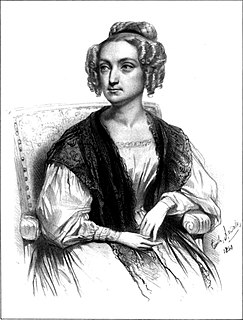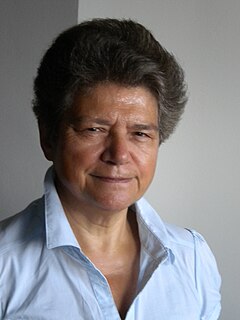Claude-Sixte Sautreau de Marsy was a French journalist and man of letters.
The abbé Simon-Joseph Pellegrin (1663 – 5 September 1745) was a French poet and playwright, a librettist who collaborated with Jean-Philippe Rameau and other composers.
Geneviève Hasenohr is a French philologist and prolific scholar of medieval and Renaissance French literature. She has authored or contributed to more than forty books, written at least fifty academic articles and reviews, and prepared numerous scholarly editions.
Louis Philipon de La Madelaine was an 18th–19th-century French writer, chansonnier, philologist and goguettier.
Pierre Antoine Jean-Baptiste Villiers was a French playwright, journalist and poet.
Louis d'Ussieux, real name Louis Dussieux, was an 18th-century French writer, historian, journalist, translator and agronomist.

Amable Tastu, real name Sabine Casimire Amable Voïart, was a 19th-century French femme de lettres.
Élisabeth Guibert was an 18th-century French women writer.
Claire-Marie Mazarelli, marquise de la Vieuville de Saint-Chamond was an 18th-century French woman of letters.
Jean-Auguste Jullien, called Desboulmiers, 1731, Paris – 1771, Paris, was an 18th-century French man of letters, historian of theatre and playwright.
Joseph de La Porte, was an 18th-century French priest, literary critic, poet and playwright.
Jean-François-Marie d'Arquier de Barbegal (1761–1794), also known as de Baumelles, parliamentarian from Aix in the 18th century, was involved in the federalist movement of 1793 during the French Revolution.

Louis Vivien, called Vivien de Saint-Martin, was a 19th-century French geographer.
Émilienne Demougeot was a 20th-century French historian, a specialist of Late Antiquity and Early Christianity. She was one of the first women professors of history at a French university, and the first woman professor at the Faculty of Letters at the University of Montpellier.
Anselme Louis Bernard Bréchillet-Jourdain, was a French dentist and surgeon. The orientalist Amable Jourdain was his son.
Bernard Jullien was a French teacher, novelist and linguist.

Danièle Pistone is a French musicologist, emeritus professor at the University Paris Sorbonne 4.
François Louis Julien Simon Héron was a French revolutionary, an agent of the Committee of General Security.
Marie Bobillier, real name Antoinette Christine Marie Bobillier was a French musicologist, music critic, writing under her pseudonym Michel Brenet.
Nicole Wild was a French musicologist, chief curator at the Paris Opera Library and Museum, and a specialist in the history and iconography of opera in France in the 19th century.





